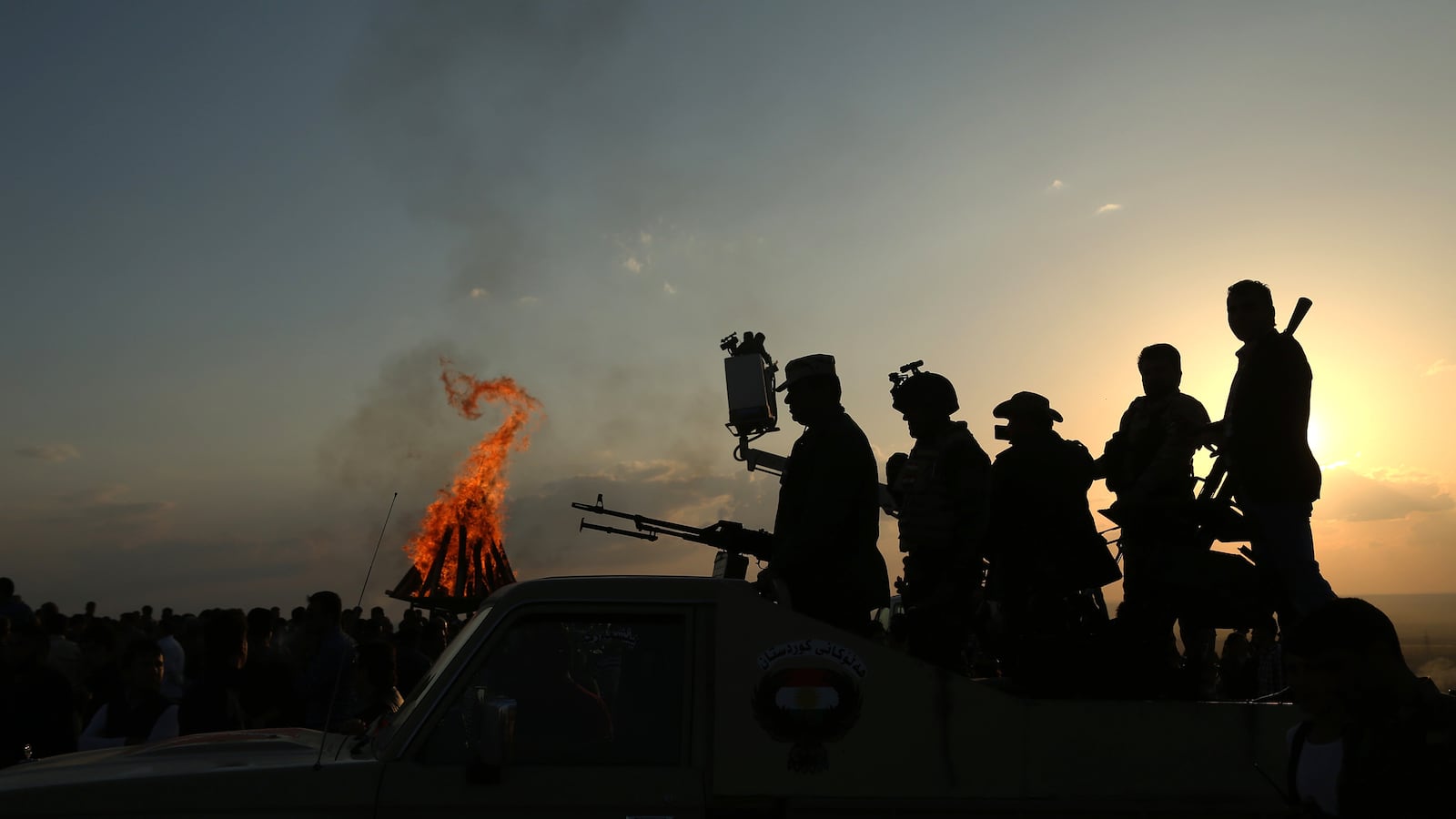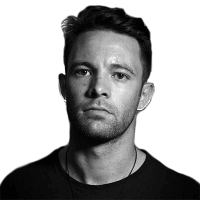AKRE, Iraqi Kurdistan—The festival of light and hope is drawing to an end, and the horror that everyone here feared, and thought almost inevitable, has not yet happened. Most of the 21 Kurdish sons and brothers and fathers captured by the so-called Islamic State (ISIS) this year, seen in videos wearing the orange jumpsuits of the soon-to-be-slaughtered and shown in cages like those about to be burned alive—may yet be in the land of the living.
But ISIS is the cruelest of captors, knowing too well how to use hope to deepen anger and despair. Suspense is one of its weapons. And few of the people here have any illusions about that. So the Kurdish New Year celebration of light at the beginning of spring, Newroz, has gone on in the shadow of ISIS and the desperate but determined war to defeat it, even as the Kurds draw strength from its mythology of defiance and endurance to go on.
As the sun set last Friday evening in Akre a long, fiery serpent began crawling up the jagged, rocky mountainside of the nearby Kele mountain. Thunder and hailstorms loomed in the distance, and smoke filled the air as a procession bearing 100 torches ascended the peak to light a bonfire for the pagan-rooted holiday.

As the torchbearers zigzagged up the mountain, revelers from nearby hillsides gathered to watch. Men—young and old—assembled in new military fatigues and more traditional Kurdish baggy pants and belt sashes. Women and girls joined them in brightly colored sequined dresses and scarves, and children set off fireworks with abandon.
Looking to heighten the excitement, young men took AK-47 rifles and shot them recklessly into the air to the cheers of their peers. Newroz, the traditional Persian New Year, which has become a decidedly nationalistic affair for the Kurds, dates as far back as the beginning of the Zoroastrian period in the 6th century B.C.
In a grim sort of tease, ISIS released a video on Thursday purportedly showing the beheading of three Kurdish prisoners. Whether they were among the 21 paraded in orange jumpsuits and cages earlier this year is not clear. Most were taken captive in fighting in late January and early February near Kirkuk. Yet another video released Monday by the group showed what was claimed to be a lone Kurdish prisoner shot execution style.
Kurdish officials adopted a somber tone. “Newroz is a day that under the most difficult circumstances in the past has been celebrated in one way or another,” Kurdish government spokesman Safeen Muhsin Dizayee told The Daily Beast last week. “But because of the war with ISIS and the people who have been killed or wounded, the government is not having any official celebration.”
Although local Newroz festivals went on despite the latest ISIS video and Dizayee’s comments, concerns grew that the captives will be killed in much the same way that ISIS murdered Jordanian pilot Muadh al Kasasbeh this year—but on a much larger scale.
“We’re all thinking of them,” said 21-year-old Akre student Ivan Ahmed on the topic of the captive Kurds. “ISIS, they’re not Muslims, the way they do these things.”
Speaking while standing atop a hillside cemetery, flanked by his friends and watching the Newroz festivities unfold in Akre on Friday night, Ahmed said the Kurds still wanted Newroz to remain joyous this year, and wouldn’t let ISIS spoil it.
“Newroz in Akre is a party, you see all the children running around having a good time,” he said. “People now are celebrating, we don’t want to think about [ISIS] burnings, we want to think about anything else.”
ISIS has already shown a hatred of sites and traditions in Iraq and Syria that are pre-Islamic, or that the group finds to be graven images. It’s taken to smashing and destroying a number of ancient Assyrian and Christian monuments in northern Iraq, and has even demolished structures holy in mainstream Islam like Jonah’s Tomb in Mosul, which it considers idolatrous.
Newroz is celebrated across the former Persian Empire, and has taken on different meanings and legends throughout central Asia. In Kurdish tales the festival commemorates the mythical hero and blacksmith Kawa and his battle with the Assyrian tyrant Zahak. Versions of the tale vary even among the Kurds, but in the basic outline Kawa challenges Zahak because the ruler demanded child sacrifices. Zahak in some depictions is shown as more demon than man, and has two snakes growing out of his shoulders. Zahak’s snakes eat the brains of his child victims, which gives him extended life. In the legends, Kawa strikes Zahak with a killing blow from his blacksmith’s hammer, and the ensuing sparks set the peaks on fire to tell the world of Kawa’s victory.
ISIS’s threat to burn the captive Kurds on Newroz toyed with Newroz’s concepts of fire, a sick irony the group may well have calculated.
It’s traditional on Newroz for Kurds to not only light the bonfires in commemoration of Zahak’s defeat, but also to jump over them in order to gain good luck in the new year.
But the symbolism in Kawa’s tale isn’t lost on the Kurds either, who in the ancient liberation myth see a parallel between their own struggles with outside aggressors today. The legend was kept alive in their decades battling Iraqi dictator Saddam Hussein, and it’s now been repurposed for the fight of the Kurdish region’s military, the Peshmerga, against ISIS.
Former Iraqi Kurdish Prime Minister Barham Salih said in comments published Friday that Kawa was “the Kurdish Peshmerga of his time,” and Kurds would not be intimidated by ISIS’s latest executions.
He also called for a “Newroz of defiance,” saying “this Newroz should be celebrated for affirming the united message of Kurds against [ISIS].”
Salih’s calls for resilience and resistance were partially echoed by some in the Iraqi Kurdish capital Erbil on Saturday, but many said that even though they intended to celebrate, they were still thinking of the Kurds in ISIS captivity.
“Newroz is fine this year, but it’s not like it has been in the years before,” said 49-year-old Ahmed Abdulrahman as he stood speaking with friends in the city’s main bazaar beneath its 6,000-year-old citadel. “It’s because of the killed Peshmerga; the people are still celebrating, but the martyrs are very much on everyone’s minds.”
The Kurds will still prevail, he declared. “ISIS will lose and the Peshmerga will be victorious,” said Abdulrahman. “The end of ISIS will be a Peshmerga festival.”
“We are all Peshmerga!” he and his friends shouted in unison.

Housewife Islam Mohamed, 30, came to the bazaar Saturday with her husband, Assam, 45, and two small children. Mohamed’s 2-year-old daughter Malika was dressed in a traditional red, white and green Kurdish dress complimented by a medal-tasseled red headdress, Her 3-year-old son Amir, like his father, wore traditional baggy trousers and a shiny sash belt. Mohamed said her family had come to celebrate, and they were trying to stay positive and ignore the ISIS threat. “Newroz is all good fun, there are no worries and everyone’s happy,” she insisted.
Beyond the question of ISIS, Newroz in Kurdistan this year served as a bold statement for Kurdish self-determination. Relations between the Kurds and Baghdad have become more and more strained even as they fight a common enemy. Nearly every hilltop with a bonfire this Newroz also featured some version of the sun-emblem red, white and green Kurdish flag draped down the cliffs and hilltops. In the air Friday night in Akre, Kurdish nationalism ran just as thick as the gunpowder and smoke coming off the firecrackers and rifle bursts. Many here now believe that given the Iraqi Kurds’ sacrifices on the battlefield, they’re closer than ever to realizing their dream of separation from the central government.
“We’ll get it, we’ll get our own country,” declared 26-year-old Akre native Azad Haidar Molut.
Watching the torches ascend Kele, Molut added that his support of Kurdish independence is actually a little complicated, given his current job as a first sergeant in the Iraqi national army—not the Kurdish Peshmerga. This night, however, Molut was on leave, and dressed up in a pink dress shirt. He showed off photos on his phone of himself in Mosul before ISIS took the city—the second-largest metropolis in Iraq—last June. He said his direct experiences under poor leadership from Baghdad under the regime of then-Iraqi Prime Minister Nouri al Maliki and a corrupt politically appointed sectarian officer corps made him support Kurdish independence all the more.
“It’s all because Maliki and the Shias, they’re responsible for ISIS,” he said. “They pulled out of Mosul, and then ISIS took it over.”
“It’s a difficult situation, but we’re Kurds, and we’re proud of our Peshmerga martyrs,” Molut said as the peaks caught fire behind him. “We’ll get our independence, and it will all be because of Maliki.”







